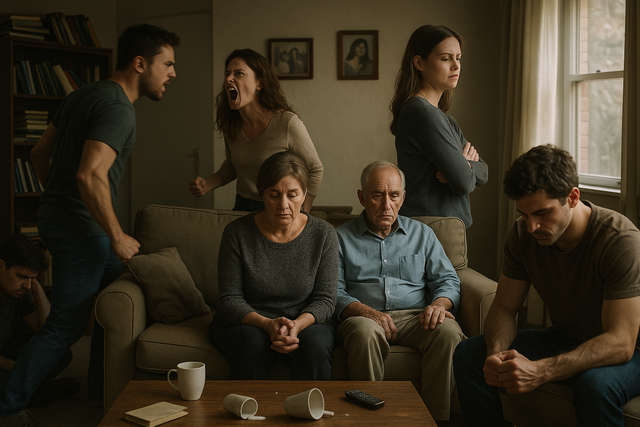From the Heart of Chaos to the Awareness of the Survivor.
hidden dysfunctional families and psychological scars.
From the Heart of Chaos... to the Awareness of the Survivor
There are families not made of love, but of performance, where the bonds of affection are replaced by roles in a psychological theater. These families don’t raise children, they cast roles. The mother becomes the director of emotional manipulation, the father fades into the shadows of absence, and the children are assigned parts that suffocate their individuality.
This article is not a recount of a specific story, but rather a study of a familiar and haunting pattern, a behavioral blueprint deeply ingrained in households governed by dysfunction rather than connection.
The Core Problem: Emotional Roleplay Instead of Emotional Safety
In healthy families, emotional expression is a tool for bonding. In toxic families, emotional expression becomes a weapon. The child learns not how to feel but how to adapt.
The key term here is "pseudo-individuation", the illusion of becoming oneself while merely fulfilling a pre-assigned role. Examples include:
The "strong one"
The "scapegoat"
The "golden child"
The "silent absorber"
These are not identities; they are defensive postures adopted for psychological survival.
Here lies the core trauma: the child does not develop an integrated sense of self. Instead, the self fragments into roles that serve the dominant figures in the home. This leads to what psychology terms "role-based identity dissociation".
Consequences: The Long Shadow of Dysfunction
The psychological scars from toxic households are often invisible but devastating:
Chronic self-doubt
Hypervigilance in relationships
Inability to trust or attach securely
Fear of autonomy
Overattachment to emotionally unavailable people
Many survivors carry guilt for leaving such families. Behavioral psychology refers to this as "conditioned loyalty trauma", a psychological state in which the survivor feels morally obligated to maintain ties with toxic relatives, even at the expense of their own wellbeing.
The longer one remains immersed in such environments, the more the internal compass malfunctions. The individual begins to mistake control for love and drama for passion.
Breaking the Cycle: Awareness as Rebirth
Awareness rarely arrives gently, it comes as a breakdown. It may follow betrayal, manipulation, emotional collapse, or being cast out.
This moment marks the beginning of what psychologists call "constructive detachment", a conscious decision to remove oneself psychologically and emotionally, often before the physical departure even occurs.
True awareness is not a singular moment. It is a journey:
Recognition: Acknowledging that what was once normalized was actually abusive.
Deconstruction: Examining the roles one was forced to play.
Reintegration: Rebuilding the self outside of survival modes.
Reengagement: Learning to re-enter the world with boundaries and authenticity.
Why Behavioral and Social Psychology Matter
Behavioral psychology helps us understand how trauma conditions responses—why a person flinches at kindness or distrusts peace. It reveals the deep programming that makes chaos feel familiar and safety feel suspicious.
Social psychology, on the other hand, allows us to decode how group dynamics normalize dysfunction, especially in closed systems like families. It explains how a shared narrative of “this is normal” can imprison entire generations.
These disciplines are not merely academic, they are lifelines for those trying to make sense of internal chaos. Without them, survivors may mislabel their adaptive strategies as flaws. With them, they gain tools to decode, detach, and reclaim agency.
Societal Impact: Toxic Families, Broken Communities
When dysfunction is passed down unchecked, it doesn't just ruin individuals, it fractures society. Children who grow up in these systems often become adults who:
Struggle to form stable relationships
Project their unresolved trauma onto their partners or children
Remain emotionally dependent on toxic figures
Repeat the same harmful patterns in professional and social settings
The ripple effect of one emotionally toxic household can distort generations. That is why public awareness and access to psychological education are not luxuries—they are necessities.
Investing in behavioral and social psychology is an investment in community healing. Therapy, psychoeducation, and safe dialogues should be normalized, not stigmatized.
A Message to Survivors
You are not broken. You are not too much. You are not dramatic.
You are the sane one who was placed in insane surroundings. Your journey from chaos to awareness is not a weakness, it is a masterpiece in the making.
Your story may have begun in confusion, but it can end in clarity, strength, and peace.
